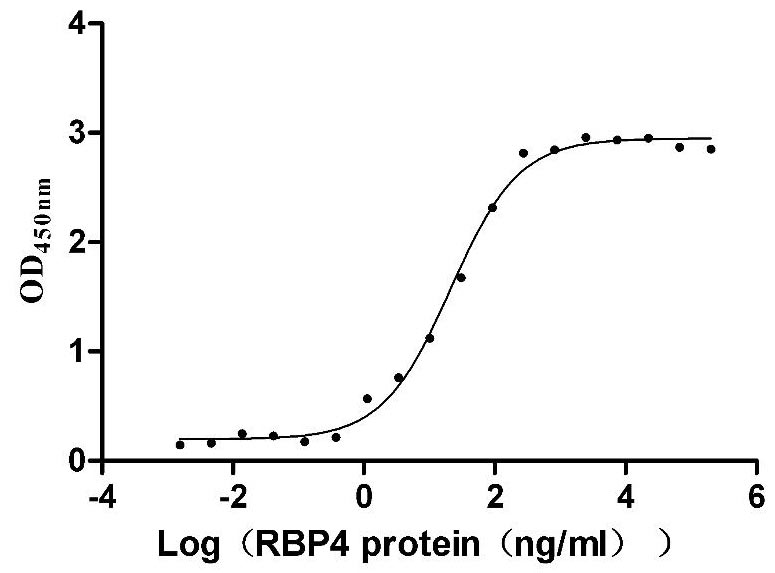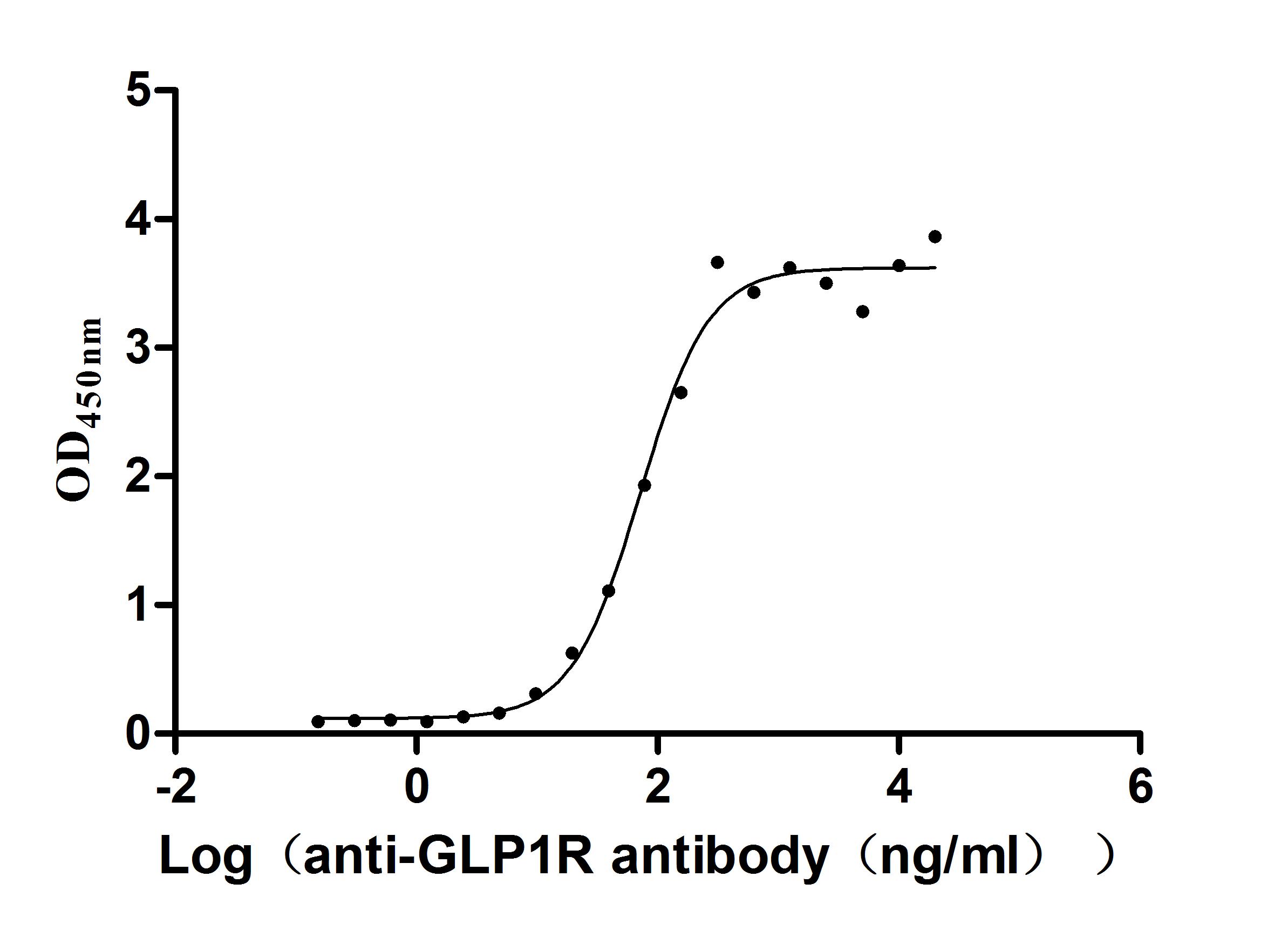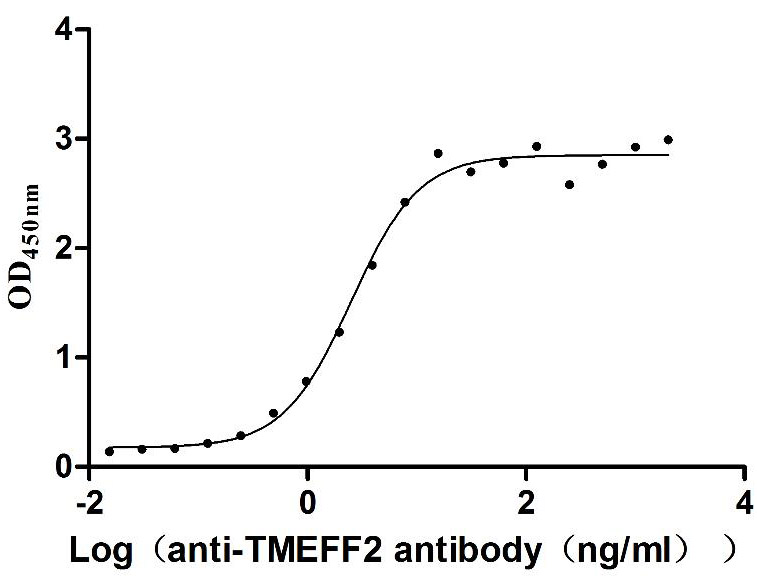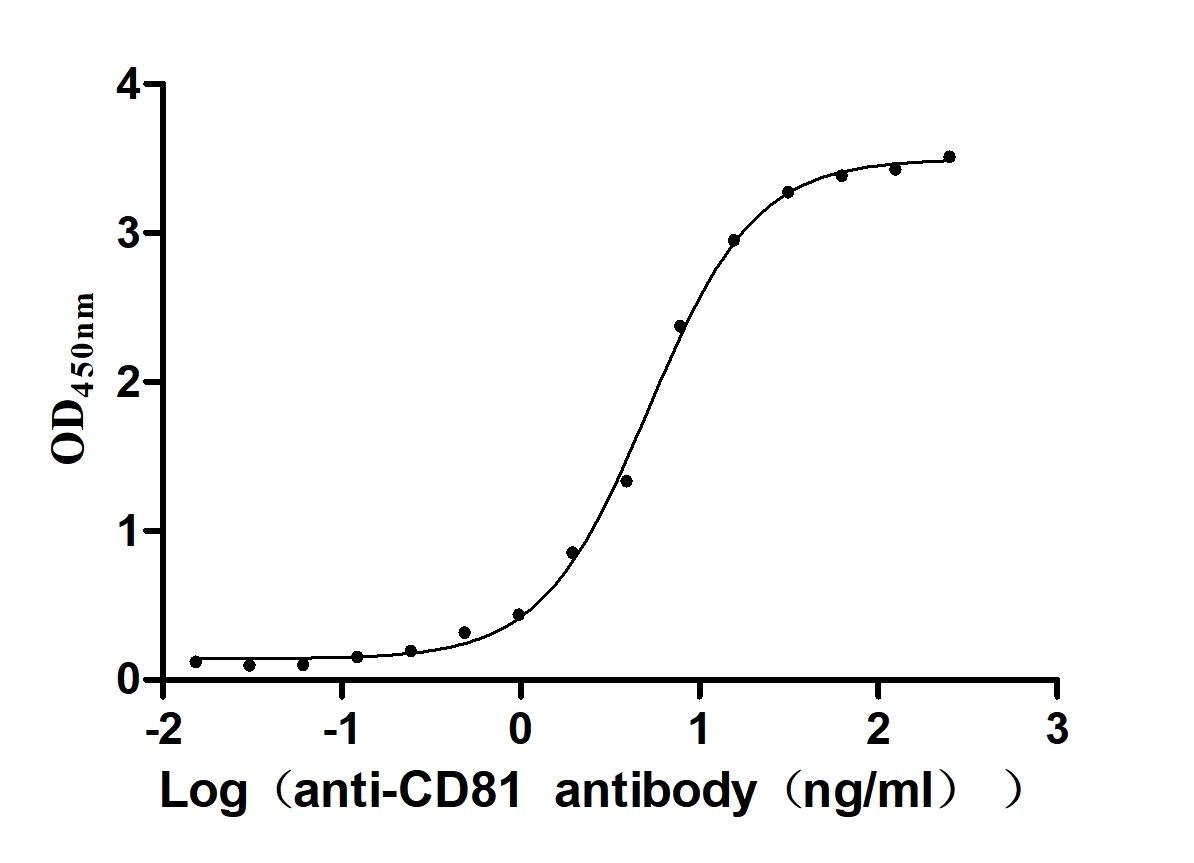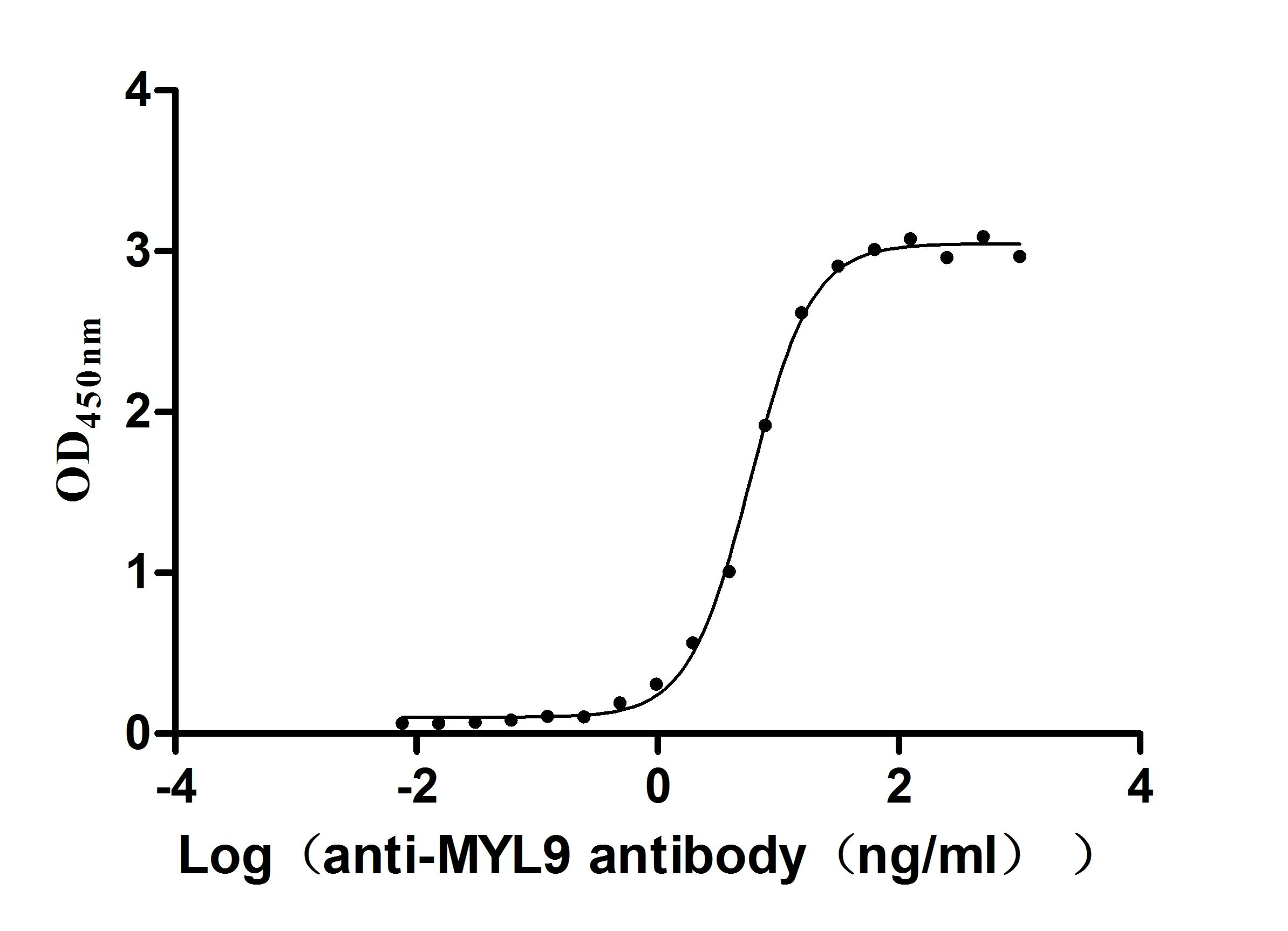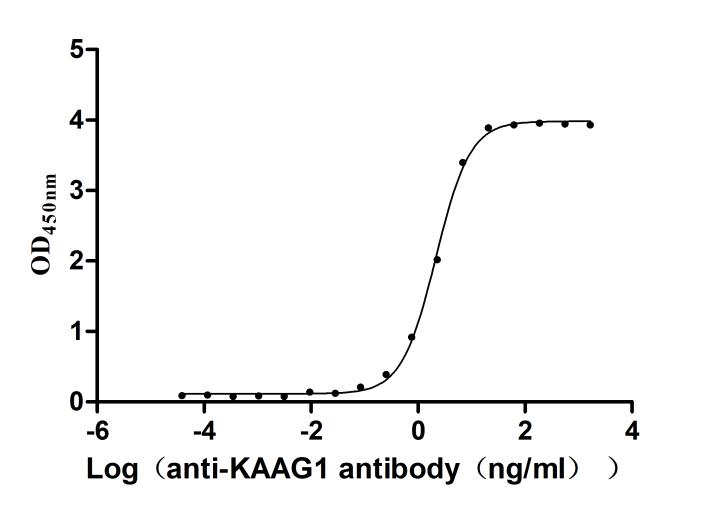Recombinant Human Serine--pyruvate aminotransferase (AGXT)
-
中文名称:Recombinant Human Serine--pyruvate aminotransferase(AGXT)
-
货号:CSB-BP001468HU
-
规格:
-
来源:Baculovirus
-
其他:
-
中文名称:Recombinant Human Serine--pyruvate aminotransferase(AGXT)
-
货号:CSB-EP001468HU-B
-
规格:
-
来源:E.coli
-
共轭:Avi-tag Biotinylated
E. coli biotin ligase (BirA) is highly specific in covalently attaching biotin to the 15 amino acid AviTag peptide. This recombinant protein was biotinylated in vivo by AviTag-BirA technology, which method is BriA catalyzes amide linkage between the biotin and the specific lysine of the AviTag.
-
其他:
-
中文名称:Recombinant Human Serine--pyruvate aminotransferase(AGXT)
-
货号:CSB-MP001468HU
-
规格:
-
来源:Mammalian cell
-
其他:
产品详情
-
纯度:>85% (SDS-PAGE)
-
基因名:Name:AGXT Synonyms:AGT1, SPAT
-
Uniprot No.:
-
别名:AGT; AGT1; Agxt; AGXT1; Alanine glyoxylate aminotransferase; Alanine glyoxylate aminotransferase3; Alanine--glyoxylate aminotransferase; EC 2.6.1.44; EC 2.6.1.51; Hepatic peroxisomal alanine glyoxylate aminotransferase; Hepatic peroxisomal alanine:glyoxylate aminotransferase; L alanine glyoxylate aminotransferase 1; MS773; PH1; Serine pyruvate aminotransferase; Serine--pyruvate aminotransferase; Serine--pyruvate aminotransferase, mitochondrial; Serine:pyruvate aminotransferase; SPAT; SPT; SPYA_HUMAN; TLH6
-
种属:Homo sapiens (Human)
-
蛋白长度:Full length protein
-
表达区域:1-392
-
氨基酸序列MASHKLLVTP PKALLKPLSI PNQLLLGPGP SNLPPRIMAA GGLQMIGSMS KDMYQIMDEI KEGIQYVFQT RNPLTLVISG SGHCALEAAL VNVLEPGDSF LVGANGIWGQ RAVDIGERIG ARVHPMTKDP GGHYTLQEVE EGLAQHKPVL LFLTHGESST GVLQPLDGFG ELCHRYKCLL LVDSVASLGG TPLYMDRQGI DILYSGSQKA LNAPPGTSLI SFSDKAKKKM YSRKTKPFSF YLDIKWLANF WGCDDQPRMY HHTIPVISLY SLRESLALIA EQGLENSWRQ HREAAAYLHG RLQALGLQLF VKDPALRLPT VTTVAVPAGY DWRDIVSYVI DHFDIEIMGG LGPSTGKVLR IGLLGCNATR ENVDRVTEAL RAALQHCPKK KL
-
蛋白标签:Tag type will be determined during the manufacturing process.
The tag type will be determined during production process. If you have specified tag type, please tell us and we will develop the specified tag preferentially. -
产品提供形式:Lyophilized powder
Note: We will preferentially ship the format that we have in stock, however, if you have any special requirement for the format, please remark your requirement when placing the order, we will prepare according to your demand. -
复溶:We recommend that this vial be briefly centrifuged prior to opening to bring the contents to the bottom. Please reconstitute protein in deionized sterile water to a concentration of 0.1-1.0 mg/mL.We recommend to add 5-50% of glycerol (final concentration) and aliquot for long-term storage at -20℃/-80℃. Our default final concentration of glycerol is 50%. Customers could use it as reference.
-
储存条件:Store at -20°C/-80°C upon receipt, aliquoting is necessary for mutiple use. Avoid repeated freeze-thaw cycles.
-
保质期:The shelf life is related to many factors, storage state, buffer ingredients, storage temperature and the stability of the protein itself.
Generally, the shelf life of liquid form is 6 months at -20°C/-80°C. The shelf life of lyophilized form is 12 months at -20°C/-80°C. -
货期:Delivery time may differ from different purchasing way or location, please kindly consult your local distributors for specific delivery time.Note: All of our proteins are default shipped with normal blue ice packs, if you request to ship with dry ice, please communicate with us in advance and extra fees will be charged.
-
注意事项:Repeated freezing and thawing is not recommended. Store working aliquots at 4°C for up to one week.
-
Datasheet :Please contact us to get it.
相关产品
靶点详情
-
基因功能参考文献:
- Mutations at the dimer interface of alanine-glyoxylate aminotransferase alter enzyme structure/activity, leading to primary hyperoxaluria type I and determine the cellular response to vitamin B6. PMID: 29110180
- two novel AGXT missense mutations (p.M49L and p.N72I), which will enrich the AGXT mutation database and provide a better comprehension of PH1 pathogenesis, were identified in a big Chinese PH1 family. Significant morphological and structural difference of kidney stones from two siblings with the same genotype observed in this study displays the heterogeneity of genotype-phenotype correlation PMID: 27644547
- AGXT mutational analysis was performed to confirm the diagnosis of PH1. PMID: 28161266
- this study identifies a novel AGXT gene mutation in primary hyperoxaluria after kidney transplantation failure in Tunisian patient PMID: 27568336
- AGXT gene sequencing is now the choice of diagnosis of Primary hyperoxaluria type 1 (PH1)due to its non-invasive nature compared to liver enzyme assay. Early diagnosis and accurate treatment in PH1 is important for better patient outcomes. PMID: 27915025
- Caenorhabditis elegans AGXT-1 is a mitochondrial and temperature-adapted ortholog of peroxisomal human AGT1. PMID: 27179589
- Novel AGXT mutations in a Tunisian population with primary hyperoxaluria type 1. PMID: 27935012
- The novel p.Gln137Hisfs*19 AGXT mutation detected in this study extends the spectrum of known primary hyperoxaluria type I AGXT gene mutations in Tunisia. PMID: 27659337
- Data show that onomeric minor allele of human alanine glyoxylate aminotransferase (AGT-Mi) binds pyridoxal 5-phosphate (PLP) but does not display catalytic activity. PMID: 27720751
- Letter/Case Report: novel missense AGXT gene mutation in a Sri Lankan family with primary hyperoxaluria type 1. PMID: 26693850
- Primary hyperoxaluria type 1 (PH1) is due to a defect in the AGXT gene. The aim of our study was to analyze the mutations causing PH1 in the Moroccan population PMID: 26383609
- In conclusion, this study of an unprecedented number of primary hyperoxaluria type 1 patients showed geno-phenotype associations that have not been previously reported. PMID: 24988064
- The pathogenic mutation G47R causes misfolding of alanine:glyoxylate aminotransferase. PMID: 26149463
- A review of the current knowledge of the biochemical properties of liver peroxisomal alanine:glyoxylate aminotransferase and of the molecular defects caused by single point mutations associated with Primary Hyperoxaluria Type 1. PMID: 25620715
- S81L and G170R mutations of AGT is associated with Primary Hyperoxaluria type I in homozygosis and heterozygosis. PMID: 24990153
- AGT missense mutations associated with Primary Hyperoxaluria Type 1, were characterized. PMID: 24718375
- Data suggest that dequalinium chloride (DECA) may be a pharmacologic strategy to treat primary hyperoxaluria 1 (PH1) patients with mutations in alanine:glyoxylate aminotransferase (AGT). PMID: 25237136
- These are the first cases of primary hyperoxaluria type 1 to be diagnosed by clinical manifestations and AGXT gene mutations in mainland China. PMID: 24934730
- data imply that the AGT Pro11Leu polymorphism is not directly responsible for the low incidence of stone formation in black South Africans. PMID: 24344980
- Modeling of the mutations on a 1.9 A crystal structure suggests that Primary hyperoxaluria type I causing mutants perturb locally the native structure of AGT. PMID: 24205397
- The view presented has important implications for the development of new therapeutic strategies based on targeting specific elements of alanine-glyoxylate aminotransferase homeostasis PMID: 23956997
- Gly161 mutations in alanine:glyoxylate aminotransferase is associated with Primary Hyperoxaluria Type I. PMID: 24055001
- Solved is the X-ray crystal structure of the S187F variant of AGT to a resolution of 2.9 A. PMID: 23589421
- Identification of a double mutation c.32C>T (Pro11Leu) and c.731T>C (p.Ile244Thr) in AGXT gene in five unrelated Tunisian families with primary hyperoxaluria type 1 disease. PMID: 24012869
- Three novel mutations detected in the AGXT gene associated with primary hyperoxaluria type 1 in a Tunisian patient population. PMID: 23810941
- Four of the most common mutations in primary hyperoxaluria type 1 unmask the cryptic mitochondrial targeting sequence of alanine:glyoxylate aminotransferase encoded by the polymorphic minor allele PMID: 23229545
- The molecular mechanism of recognition by the peroxisomal receptor Pex5p, in complex with alanine-glyoxylate aminotransferase revealed by X-ray crystallography. PMID: 22529745
- These results suggest that the N-terminal extension plays an essential role in allowing AGT to attain its correct conformation and functional activity. PMID: 22198249
- A side-by-side comparison was performed between normal AGT and nine purified recombinant pathogenic variants in terms of catalytic activity, coenzyme binding mode and affinity, spectroscopic features, oligomerization, and thermal stability. PMID: 22018727
- selected aspects of the biochemical properties of the two allelic forms of AGXT and of some primary hyperoxaluria type 1-causing variants (review) PMID: 22201765
- Partially unfolded states of AGXT strongly interact with Hsc70 and Hsp90 chaperones. PMID: 21103899
- Selected AGXT gene mutations analysis provides a genetic diagnosis in 28% of Tunisian patients with primary hyperoxaluria. PMID: 21612638
- Data show that P11L mutation is responsible for the urea sensitivity of AGT-Mi. PMID: 20713123
- mutation of the AGXT gene, showing the patient to be compound heterozygous for the c.33_34InsC and c.508G > A mutations PMID: 20020206
- Genotype-phenotype correlation in primary hypoxaluria type 1: the p. Gly170Arg AGXT mutation is associated with a better outcome. PMID: 20016466
- Molecular defects of the glycine 41 variants of alanine glyoxylate aminotransferase associated with primary hyperoxaluria type I. PMID: 20133649
- investigated occurrence of Pro11Leu polymorphism in both herder & agriculturalist populations from Central Asia; findings show distribution of variation observed in the AGXT gene could be due to demographic history, rather than local adaptation to diet PMID: 20059472
- crystal structure of AGT consists of an intimate dimer in which an extended N-terminal segment of 21 amino acids from one subunit wraps as an elongated irregular coil around the outside of the crystallographic symmetry-related subunit. PMID: 20208150
- 3D picture of an in vivo early ATP-dependent step of the folding reaction cycle of the chaperonin and supports a GroEL functional model in which the chaperonin promotes folding of the AGXT-LTM mutant protein through forced unfolding mechanism PMID: 20056599
- serine:pyruvate aminotransferase expression is regulated by Sp1, AP-2 and PKA PMID: 12169688
- crystal structure of normal human AGT complexed to the competitive inhibitor amino-oxyacetic acid to 2.5A PMID: 12899834
- Early detection of Gly170Arg and Phe152Ile mutations in PH1 has important clinical implications because of their association with pyridoxine responsiveness and clinical outcome PMID: 15253729
- report describing 3 AGXT gene mutations in Chinese patients with primary hyperoxaluria type 1 PMID: 15365967
- mutations with serious consequences in vivo may not be inherently catalytically inactive and may be rescuable PMID: 15802217
- human AGT interacts with human Pex5p in mammalian cells, but not yeast cells; type 1 peroxisomal targeting sequence(PTS1)is located entirely within the smaller C-terminal structural domain of 110 amino acids PMID: 15911627
- Determination of crystal structure of AGT has enabled effects of some of most important missense mutations in AGXT gene to be rationalised in terms of AGT folding, dimerization and stability. New possibilities for design of pharmacological agents. PMID: 15961951
- Presentation and role of transplantation [kidney and/or liver] in adult patients with type 1 primary hyperoxaluria and the 1244T AGXT mutation in a university hospital in Spain are presented. PMID: 16912707
- The effects of missense mutations on enzyme activity, dimerization, aggregation, and turnover were investigated. PMID: 16971151
- expressed wild-type human AGT1 was predominantly localized in mouse hepatocellular peroxisomes, whereas the most common mutant form of AGT1 (G170R) was localized predominantly in the mitochondria PMID: 17110443
- AGXT is even more variable than formerly believed in the diagnosis of primary hyperoxaluria PMID: 17460142
显示更多
收起更多
-
相关疾病:Hyperoxaluria primary 1 (HP1)
-
亚细胞定位:Peroxisome. Mitochondrion.
-
蛋白家族:Class-V pyridoxal-phosphate-dependent aminotransferase family
-
组织特异性:Liver.
-
数据库链接:
Most popular with customers
-
Recombinant Human T-cell immunoreceptor with Ig and ITIM domains (TIGIT), partial (Active)
Express system: Mammalian cell
Species: Homo sapiens (Human)
-
Recombinant Human HLA class II histocompatibility antigen gamma chain (CD74), partial (Active)
Express system: Mammalian cell
Species: Homo sapiens (Human)
-
Recombinant Mouse Transthyretin (Ttr) (Active)
Express system: Mammalian cell
Species: Mus musculus (Mouse)
-
Recombinant Human Glucagon-like peptide 1 receptor (GLP1R), partial (Active)
Express system: Mammalian cell
Species: Homo sapiens (Human)
-
Recombinant Human Tomoregulin-2 (TMEFF2), partial (Active)
Express system: Mammalian cell
Species: Homo sapiens (Human)
-
Recombinant Human CD81 antigen (CD81), partial (Active)
Express system: Mammalian cell
Species: Homo sapiens (Human)
-
Recombinant Human Myosin regulatory light chain 12A (MYL12A) (Active)
Express system: E.coli
Species: Homo sapiens (Human)
-
Recombinant Human Kidney-associated antigen 1(KAAG1) (Active)
Express system: E.coli
Species: Homo sapiens (Human)


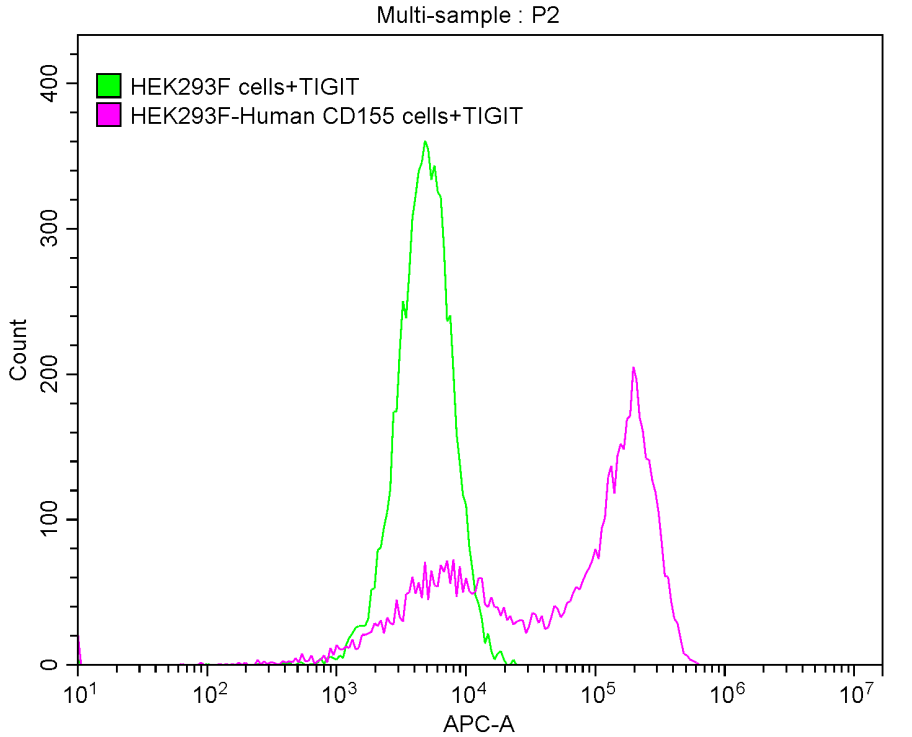
-AC1.jpg)
